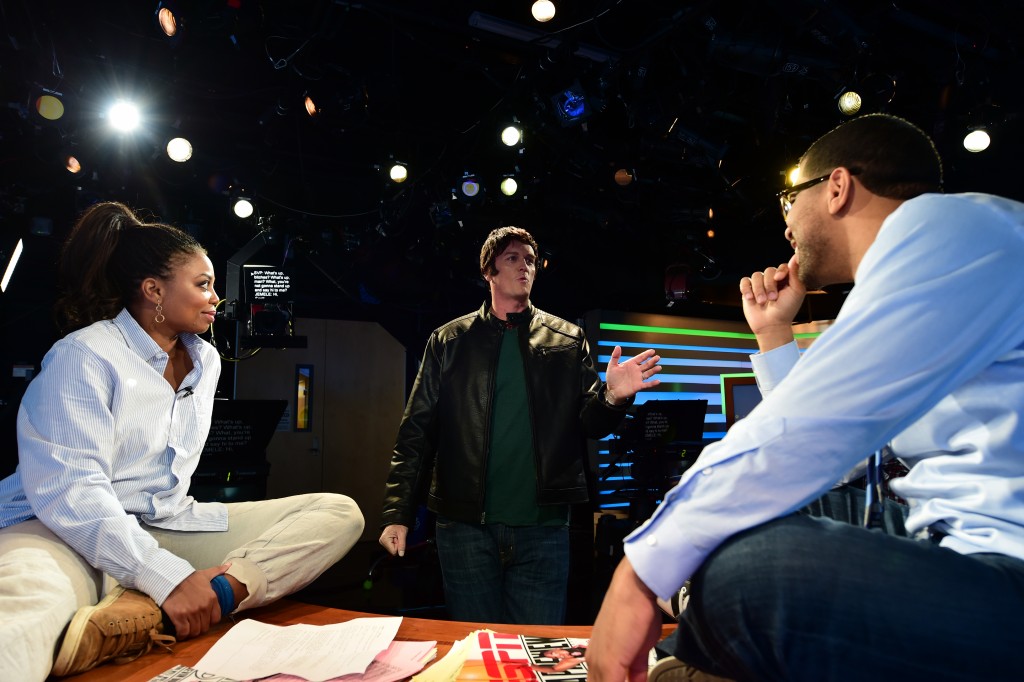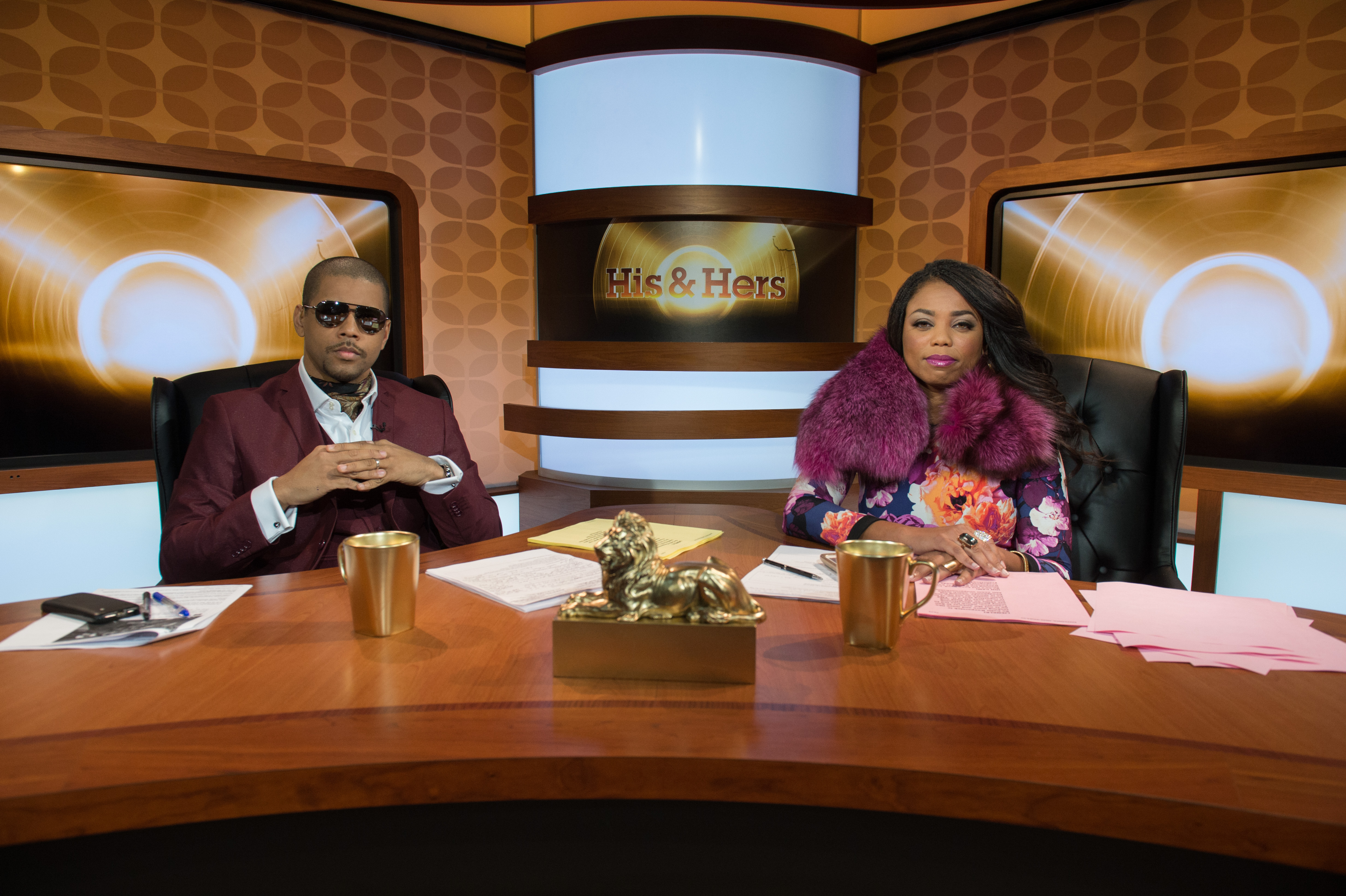Could you describe what the process is that goes into putting together a show from conception to the finished product we see on TV?
Michael Smith– I’ve always been a detail-oriented person. I’m more OCD, but she’s a perfectionist all the same. So due to a lot of different reasons and circumstances, when I started doing Numbers Never Lie, I had to take a very hands-on approach to the production. And that continued [with His & Hers], and it improved when Jemele arrived because she’s also very hands-on and knows how she wants things to go. She and I both know how good television is supposed to look. We’ve watched a lot of good television, we like to think we’ve been a part of a lot of good television and we’ve been exposed to a lot of talented people both behind and in front of the camera.
Everything soup to nuts, we have a hand it. Like literally everything. We have a very capable and supportive and talented staff, but we were always very hands on when it was Numbers Never Lie. But when they made this show His & Hers, when they put our faces on it, it was like we don’t leave anything to chance. Every aspect of the show, whether it’s the topic, the order of the topic, the video, the graphics, the topic bar, everything, we decide. We’re the executive producers of the show. And we have a staff that understands that, and they are able to come in and complement us. Complement how we do things.
Jemele and us have this very ongoing conversation all day and all night, text messaging, paying attention to the Internet, paying attention to the news, knowing each other and what type of topics work best for us, and we just keep this running dialogue going. And the next day, we both show up and we lay out what we want to talk about. We’re not a newspaper, we’re a talk show. So we talk about the things that we want to talk about. And the staff supports us and they take instructions and take suggestions and give feedback and we go back and forth and everybody wants what’s best for the show. And come noon, it’s party time.
Jemele Hill- And I think also because of the involved process, I took it very personally, and not in a negative way, but I just take it personally when people try to lump our show in with other shows. Because if you guys do this process, there is no way you can even compare to what they do because— and this is no slight to them— there’s other talent that are as heavily involved in the process of putting the show together that we are.

We’re in a fortunate position because we have people, as Mike said, that supports that. For us, the show is personal because it just took too long to get here. His & Hers is like our baby. It burst from a podcast and became a television show, and that’s not something that’s lost on us. And we wouldn’t want it another way. We realize that this kind of has to be how it is in order for us to really talk about and discuss the kinds of topics that we feel are different and fresh and kind of separate us from other commentary shows.
I recently listened to your podcast on what happened last month at the University of Missouri, when you both delved into your histories with racism. When something like that happens, what process do you go through with management at ESPN in terms of discussing race or other weighty issues, especially on a sports show?
Jemele Hill- I know there’s this perception that ESPN is the Death Star from Star Wars and that we’re walking around like mindless drones being told what to do and we have to run everything past everybody. But the process, number one, starts with us. Do we want to talk about it? Do we have passion for it? Do we feel like we can bring the proper nuance and intellect to this discussion?
And take a Missouri, for example, we obviously did. That’s something that we both felt passionate about, we both understood what it meant, not just in the larger sports aspect of it but in the wider scope of things. So that was one. And I think because our show, when you look at topics of race, gender, sexual assault, any of the heavyweights you want to put in there, I would put our show up against anybody in terms of nuance and conversation and discussion. And we have built, gained and furthered a trust with ESPN, that they know that we’re going to approach it responsibly, fairly and professionally.
So we don’t have to have to have those conversations with them. We’re not running to management asking ‘can we say this, can we say that.’ That trust is always there. From that standpoint, as long as we feel like we want to talk about it, that’s pretty much it.
Michael Smith- And going back to the question you asked of differentiating ourselves from other programs, when it comes to those types of conversations, we just have such a comfort level with having them, and not to read too much into the question but you said how do you come to those types of determinations about how to handle it on a sports show?
Well, sports and society, I won’t even say that they intersect anymore. They overlap, and historically they’ve overlapped. So Missouri, how do you not have that conversation on a sports show? And we do get brushback from people who aren’t comfortable hearing that conversation, number one. Number two, aren’t comfortable, let’s face it, hearing two black people have those types of conversations. Number three, just tuning in to ESPN to not hear those conversations. They think that’s reserved for CNN.
We get a lot of those ‘stick to sports’ crowd. We get a lot of that. And that goes back to what you were asking about earlier about differentiating ourselves. And my answer to that was ‘we’re just going to do us and if you don’t like it, change the channel.’ We’re more than comfortable with that. We’re not sticking to sports because it would be irresponsible for us to stick to sports in that context.
If something like Missouri, or Ray Rice, or Adrian Peterson— and those are obviously hot-button topics— but if something else happens and we don’t discuss it responsibly, then we’re missing our calling. Because it’s not just about being silly and then doing too much countdown. That’s fun, but it’s about tackling important issues, if possible, and enlightening even one viewer and keeping the dialogue going. So that’s one of those deals where there’s no hesitation, there’s no discussion, there’s no back and forth about whether we should, and we know that if there’s something that strikes a chord with us, we’re going to do it, consequences be damned to the viewers.
And to Jemele’s point, there’s no conversation about what we’re going to talk about because we’re going to be true to ourselves. And we’re just naturally responsible and naturally nuanced and thoughtful, if we may say so. We’re certainly not the best at it. There are people who are pretty good at it and be better than us, as the case may be, or other who people may prefer. I’m simply saying that there’s never any concern about how we’re going to approach it because that’s just who we are. They don’t have to coach us on what to say or what not to say.
CLICK HERE TO CONTINUE READING >>>







